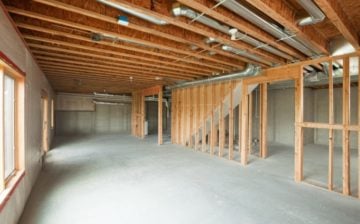
Ready to move? Exciting! But don’t forget: renovations may be needed. Unsure how to go about it? This guide is for you! Get smart tips for cost-effective decisions when renovating your new home. Get ready to spruce it up!
Budgeting for home renovation costs
Creating an accurate budget for a home renovation project is essential. Think about your current and future financial situation before starting. Here are some tips for budgeting for renovations when moving into a new house:
- Research materials costs: See what materials will cost. Prioritise essential upgrades and create a plan for future renovations.
- Prioritise projects: Break down tasks and allocate resources. Prioritise essential upgrades over aesthetics.
- Look into incentives: Check if government entities or utility companies offer grants or rebates.
- Create a timeline: Estimate how long each task should take. Build in some wiggle room. Consider DIY or hire professionals.
Assessing the condition of the new house
When refurbishing a new house, start by assessing the condition. Plan out areas that need work. Prioritize items that need attention and estimate budget needs. Factor in major rework to account for delays.
Look at walls, ceilings, floors and foundations for signs of wear and tear. Inspect wiring, plumbing and fixtures. Check for pest damage and water issues. Note down any damage found.
Check infrastructure like wiring and HVAC systems, to see if they meet safety standards. Examine paint colors, wallpaper designs and tiles. Assess furniture pieces – donate or sell if they don’t fit your design aesthetic and budget restrictions.
Hiring a professional renovation contractor
Hiring a professional renovation contractor is a wise choice for your home renovation project. With their experience and resources, they can guarantee the job is done safely and within local building codes. They also have access to skilled labor if any problems arise. Plus, they can give advice on materials and designs and provide guidance on permits and planning applications for larger renovations. Working with experienced professionals means the job is done quickly and helps you budget your renovation project so it stays within your bounds while looking great.
For example, when you work with a reputable company like Pro Renovation Contractor, they will use their expertise to ensure your project progresses smoothly and is completed on time. This will help you save money and time, which are the two most important factors when it comes to home renovations.
Choosing the right materials and finishes
When renovating a home, it’s essential to think about the type of materials and finishes. The product selection should be based on the purpose of the remodeling and how long you plan to stay there. It is also important to consider the look and how it will affect your living experience or resale value.
For example, hardwood flooring is great for living rooms and bedrooms. It’s tough and easy to keep clean. Carpet may be a better option for bedrooms or nurseries, as it absorbs sound and provides comfort.
It’s a good idea to select products that can handle the expected wear and tear. Check the warranty too, since it covers general issues that come with long-term use. For instance, look at the:
- Wearability
- Stain resistance
- Colourfastness
- Flame spread rating
- Mould and mildew resistance
- Impact resistance
- Water barrier protection
- Chemical stability
Designing a renovation plan
When you move into a new house, home renovation isn’t the first thing on your mind. Making a plan for each step of the renovation can save time, money and headaches!
Start by deciding which parts of the house to focus on. Think about safety, budgets and upgrades. Design also matters; consider colors, light and rugs or flooring variations. Create a timeline for projects and give yourself plenty of time. Get supplies that offer easy-installation. Remember to be flexible!
Managing the timeline and schedule
Planning and scheduling are musts when dealing with a home renovation. To manage the timeline better, keep records of all conversations with contractors, suppliers, and personnel. Get detailed quotes from several contractors. Note costs, timelines, and guarantees.
- Prioritize tasks and check the lease agreement for completion date.
- When painting or laying flooring and carpets, think about arrangements for storing and disposing of old furniture.
- Communicate deliverables clearly.
- Factor in possible delays due to delivery issues or permit restrictions.
- Adjust timeline expectations as needed.
Ensuring safety and compliance with regulations
When it comes to home renovation when moving house, safety and compliance are essential. Make sure all local, state, and federal regulations are observed. Contractors and subcontractors must be certified and have the proper licenses. Research the regulations for your location before starting any project. The contractor or subcontractor should provide safety equipment.
Stay informed of changes in regulations throughout the renovation process. Inspect newly completed projects for safety hazards and unexpected results. When applicable, check building materials against government standards. Get a second opinion from another certified professional. Ask them for advice on potential issues and legal ramifications.
Finally, keep detailed records including contractor invoices, reports, and permits.
Dealing with unexpected challenges
When you’re doing a home renovation, you’ll find some challenges. Be levelheaded and proactive when unanticipated problems arise! Here are some tips:
- Take some time to assess the situation. Don’t make any rash decisions.
- Set a realistic timeline, taking into account outside factors, e.g. material availability or weather, that could affect progress.
- Make a decision-making process. Use pros and cons lists or consult subcontractors.
- Choose cost-effective solutions with good results. Don’t spend money on something that won’t last long-term!
- Communicate with all relevant parties. Keep them updated for easier resolution and faster results.
Keeping communication open with contractors
Choosing the right contractors for your renovation project is key. Ask them lots of questions, to make sure they get it. Make an agreement with all details, like scope of work, completion date and payment terms.
Keep in contact with the contractors. Monitor their progress, give feedback when needed. Any issues that arise? Address them quickly, to avoid expensive delays.
Meet with them often, to discuss plans and changes. Asking questions beforehand can save time, clear up confusion about what needs doing.
Preparing for move-in and final inspection
The end of home renovation is exciting! Before move-in, make sure all improvements are done. Also, check all paperwork and title transfers. Take measurements and clean the interior.
At the final inspection, do a walk through with the inspector. Check lighting fixtures, windows, walls and flooring. Ask for written approval from the inspector before moving in to your new home!
Conclusion
Deciding which home renovation projects to invest in before moving into a new house is a big decision. It’s all about personal preference and money. Don’t rush into anything. Think of the future. Stick to your budget and concentrate on projects that add value or save money in the long-term. Then, your home renovation will be successful.
We hope you found this blog post on Guide on Home Renovation When Moving House, useful. Be sure to check out our post on Smarter Renovation and Home Improvement Tips for more great tips!
Have Experience in the Moving Industry? Want an Additional Income Stream? Work With All Around Moving!
Partner with All Around Moving and join the Work With Us program. We’ll help you make money arranging moving services, by establishing your own moving consultant business operation. Read the simple terms by Clicking here to learn more.





